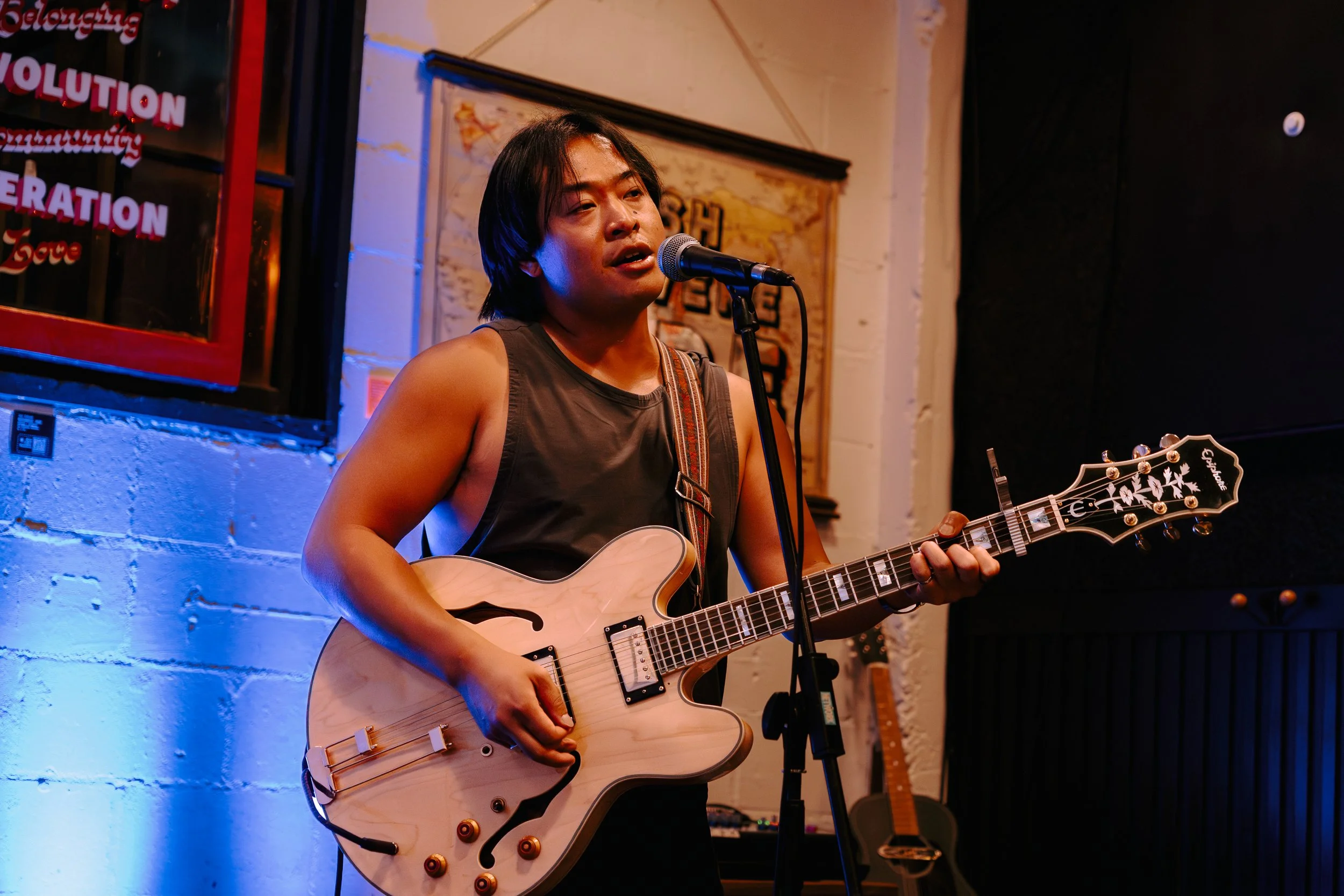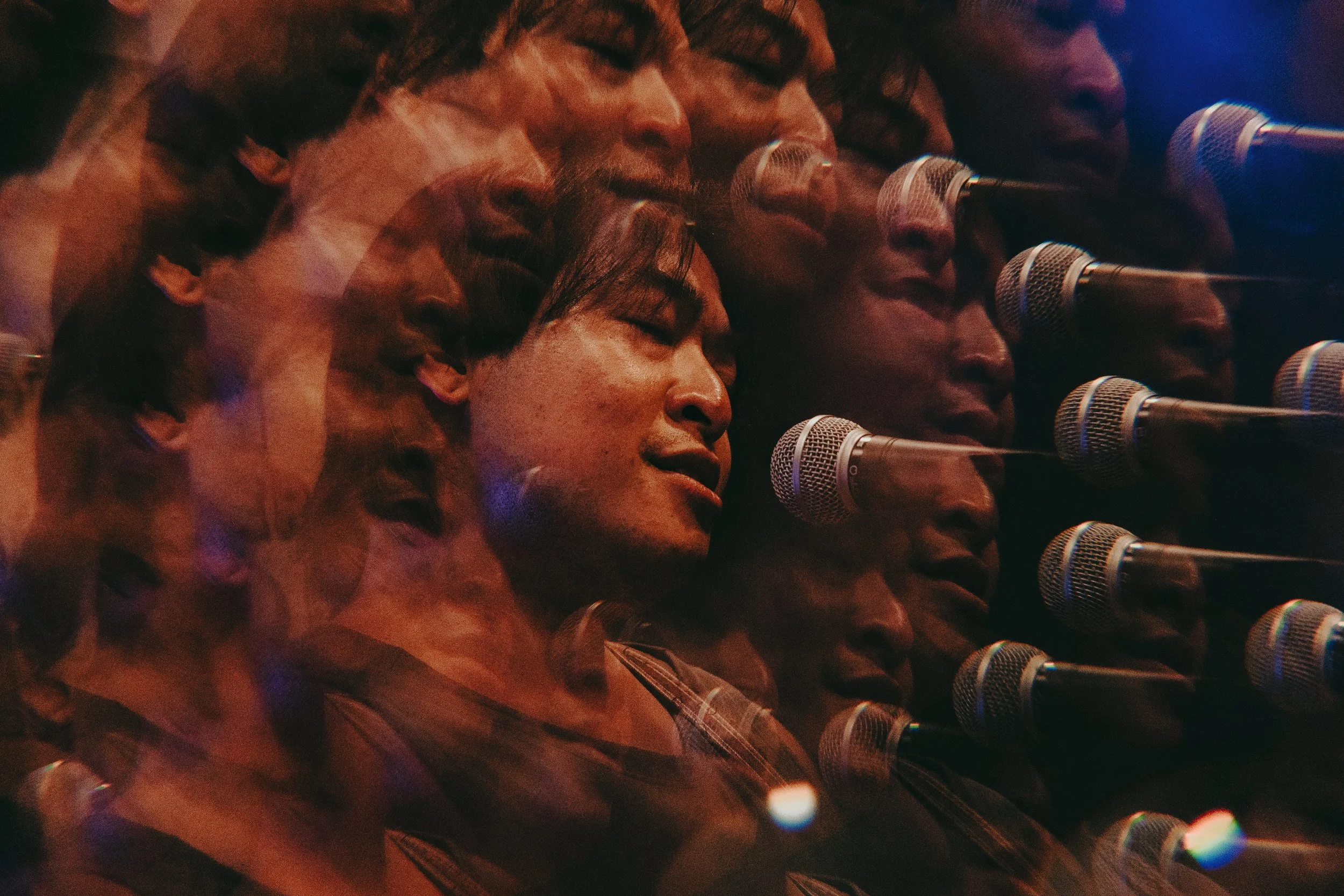Merv xx Gotti Finds His Way, One Outpost at a Time
Merv xx Gotti at High Line Brewing. Photo credit: Michael Sarsito.
At a corner table in Loophole Coffee Bar in Calgary, Marvin Chan has a half-finished cup of coffee and his MacBook propped open. It’s the tool of his two worlds: music and tech, and a fitting image for an artist who first built his solo project virtually. For years, Chan was best known as a member of Samurai Champs, the Asian-Canadian hip hop collective that once billed itself as a “touring party band.” Now, he’s front and centre in a very different light: a solo artist with nothing but a guitar, a catalogue of quietly affecting songs. His debut LP is on the way, trading party music for intimacy.
The name Merv xx Gotti, doesn’t exactly line up with the sleepy folk-inspired dreamscapes he’s been releasing, he admits with a laugh. “When I started doing this guitar stuff, I just couldn’t be bothered logistically to change it. It’s already established,” he says. “At Mariposa Folk Fest this year, people thought I was the one rap act there. Sorry to disappoint you.” The moniker itself was a gift from a university friend, a Korean classmate who learned English through hip-hop producer Irv Gotti and took to calling him “Merv Gotti,” after his favorite producer. “It wasn’t even really up to me. It just happened and it kept going” he says.
That sense of things happening by coincidence, of following what feels true rather than what fits a market, runs deep in his work. His debut full-length, Guitar Songs: A Thesis on Low Efficiency Emotional Excavation, arrives September 26. Its final single, “Minnesota,” clocks in under a minute. “What if that’s all it wants to be?” he asks. “‘Minnesota’ felt like a complete thought. I didn’t need to force it into something else.” The song was inspired by Colin “Clon” Egan, an artist Chan worked with at a tech company called Cool Cats in L.A. known for his minimalist cartoon designs, Egan’s practice of paring down until only the essential remained reframed the way Chan thought about songwriting. “There was a character that they used in the Macy’s Parade, kind of like Hello Kitty, that he would always just doodle in his notebook and it was kind of complicated at first, but he slowly simplified it down to just the simplest lines. Sometimes when people look at it they're like ‘there's nothing to it,’ but it took so much to just get to that essence of minimalism and the core idea of what he was trying to communicate.” He adds, “I think that triggered me in songwriting a little bit. It really emphasized that feeling of capturing the essence of a song - it doesn't always need to be more. You don't need elaborate production. You don't need a bridge.”
Guitar Songs album artwork.
The album’s artwork echoes this process. Designed by Korean artist Zipsy, it’s a portrait built from modular hand-drawn components from the artist. The image, he says, uncannily resembled him during the years he was writing Guitar Songs. “The jacket even looked like my dad’s first Honda jacket that he brought to Canada because that was the warmest thing he had. All my parents knew when they came here was that Canada was cold. And it also looked like me, specifically when I was making these songs. It was all coincidence.”
For Chan, these songs were never supposed to reach festival stages. He wrote them during the pandemic, alone in a basement in Regina, half-convinced he’d return to software engineering and these songs would be his personal body of work. “I fully intended to just make these songs for me,” he says. “They helped me sleep.” Slowly, though, he began sharing them in low-stakes online spaces, such as Clubhouse chats, where anonymity softened the pressure. “It was just my voice and the guitar. Tech still played a part in it, which is partly why I wanted the art to tie back to that.”
Even now, with international showcases (SXSW, M for Montreal, the upcoming Reeperbahn) under his belt, he insists the heart of the project is his community. He compares campus and community radio stations across Canada to the “outposts” in Hideo Kojima’s video game Death Stranding, tiny underground cities that connect an otherwise fragmented world. In the game, outposts are little lifelines between isolated underground cities, each one staffed with people who know their local terrain and provide supplies or knowledge to help players keep moving. “These stations live and breathe music. They’re not passive, like influencers. Without the outposts, like in Death Stranding, the route wouldn’t work.”
For Chan, community radio serves that same role. He recalls stopping in Prince George, where his first visit was to the campus station. The staff were surprised — most artists, they told him, only drop by if they have downtime between shows. Chan laughed and told them, “Are you kidding me!? My shows are the afterthought! What really matters to me is meeting people who help keep music alive.”
Merv xx Gotti at High Line Brewing. Photo credit: Michael Sarsito.
That investment in smaller, tighter networks extends beyond his solo work. He’s the vocalist in GHOSTFORM, a “side project emo band” with members of Surf Dads and Blue Youth. “We started doing Taking Back Sunday covers and then decided we could be making our own songs instead,” he says. It’s a continuation of old ties: Surf Dads’ Gage McGuire, a longtime friend from the Regina hardcore scene, also appears on the closing track of Guitar Songs, “Second Wind,” a high school relic finally realized.
“I wrote that song in high school. And it’s just one of those songs that was more for me.” He tried recording it over the years—five different times—but it never landed. “Maybe I just wasn’t mature enough as an artist,” he admits. When it came time to revisit it for Guitar Songs, he knew something was still missing. McGuire remembered hearing “Second Wind” numerous times and added his own touch with electric guitars and drums that finally gave the song its shape. “It felt full circle,” Chan says. “He’s always been one of my biggest influences, both personally and musically. His playing is so tasteful and it feels like that’s his version of singing. He brought that into the track.”
Video credit: Luke Elliot Studios
The song also ties back to another thread from those early years: Andy Shauf and Foxwarren. Chan first played “Second Wind” at a high school show that Shauf was also on, and it was Foxwarren’s Darryl Kissick who recorded the song’s very first version. “A lot of the influences were already there,” Chan says. “It’s like these reoccurring connections you don’t plan, but they resurface.”
If Samurai Champs was extroverted to its core, Guitar Songs is the opposite: introverted, reflective, private. “I’m just more naturally a quiet person,” he admits. “I’d rather play single-player games like The Witcher or Dark Souls than be online with a bunch of people.” The irony, of course, is that this quietness has carried him further than he imagined. “On a boat show with So Far Sounds in Toronto, everyone was holding each other, just so in the moment. I realized — wait, I’m the moment. I’m helping make that.”
It’s a shift not unlike the one he describes in Death Stranding: from isolated cities to connective outposts, from private rituals to shared experiences. Guitar Songs may have started in solitude, but it’s grown into community: one careful line, one sleepy chord, one outpost at a time.
Guitar Songs: A Thesis on Low Efficiency Emotional Excavation arrives September 26.




